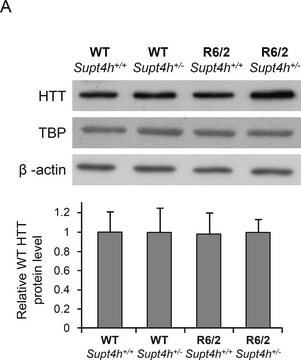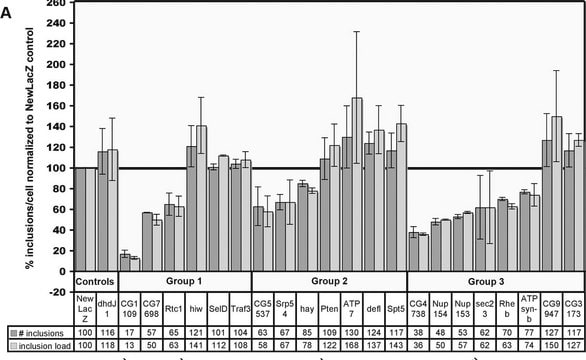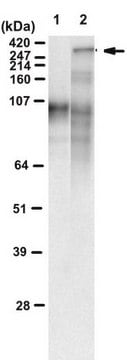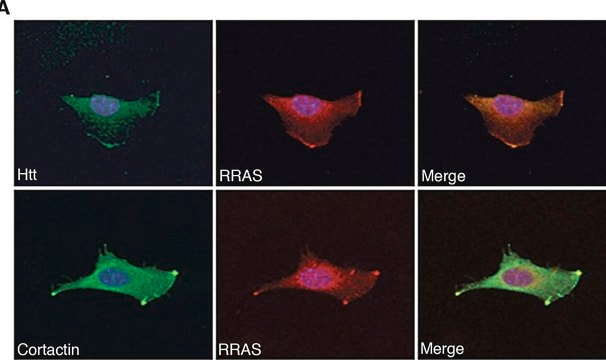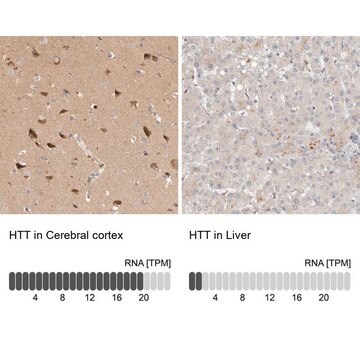추천 제품
생물학적 소스
mouse
Quality Level
결합
unconjugated
항체 형태
purified from hybridoma cell culture
항체 생산 유형
primary antibodies
클론
3B5H10, monoclonal
양식
buffered aqueous solution
종 반응성
human
포장
antibody small pack of 25 μL
농도
~2 mg/mL
기술
immunocytochemistry: suitable
immunoprecipitation (IP): suitable
western blot: 1-2 μg/mL using extract of HEK-293T cells transfected with an N-terminal 171 amino acid fragment of human Huntingtin with a 68 glutamine stretch
동형
IgG1
UniProt 수납 번호
배송 상태
dry ice
저장 온도
−20°C
타겟 번역 후 변형
unmodified
유전자 정보
human ... HTT(3064)
일반 설명
Abnormal stretch of triplet CAG (or CAA) codon produces a homomeric repeat of glutamine residues beyond the critical threshold and will lead to neurodegenerative disease. Monoclonal mouse anti-polyglutamine antibody can be used to detect poly Q protein expression and in western blot. Monoclonal anti-polyglutamines antibody reacts specifically to homomeric polyglutamines independent of the species.
면역원
GST-human Huntingtin (N-terminal fragment of 171 amino acids containing 65Q).
애플리케이션
Applications in which this antibody has been used successfully, and the associated peer-reviewed papers, are given below.
Western Blotting (1 paper)
Western Blotting (1 paper)
Monoclonal anti-polyglutamines antibody may be used for ELISA, immunoblot and slot blot. It can also be used in immunoprecipitation and immunocytochemistry.
물리적 형태
Solution in 0.01 M phosphate buffered saline, pH 7.4, containing 15 mM sodium azide.
법적 정보
This product is for in vitro use only. It is not to be used for commercial purposes. Use of this product to produce products for sale or for diagnostic, therapeutic or drug discovery purposes is prohibited. In order to obtain a license to use this product for commercial purposes, contact the Regents of the University of California. This product is sold under license to U.S. Patent No. 6,291,652, owned by the Regents of the University of California.
면책조항
Unless otherwise stated in our catalog or other company documentation accompanying the product(s), our products are intended for research use only and are not to be used for any other purpose, which includes but is not limited to, unauthorized commercial uses, in vitro diagnostic uses, ex vivo or in vivo therapeutic uses or any type of consumption or application to humans or animals.
적합한 제품을 찾을 수 없으신가요?
당사의 제품 선택기 도구.을(를) 시도해 보세요.
Storage Class Code
12 - Non Combustible Liquids
WGK
WGK 1
Flash Point (°F)
Not applicable
Flash Point (°C)
Not applicable
가장 최신 버전 중 하나를 선택하세요:
시험 성적서(COA)
Lot/Batch Number
Amy L Lee et al.
PloS one, 12(3), e0173644-e0173644 (2017-03-11)
Expanded polyglutamine repeats in different proteins are the known determinants of at least nine progressive neurodegenerative disorders whose symptoms include cognitive and motor impairment that worsen as patients age. One such disorder is Huntington's Disease (HD) that is caused by
Elizabeth Brooks et al.
Methods in molecular biology (Clifton, N.J.), 277, 103-128 (2004-06-18)
Expansion of a homomeric stretch of glutamine residues beyond a critical threshold can produce neurodegenerative disease. This observation led to the idea that abnormal polyglutamine stretches can alter protein structure in ways that contribute to disease. Because they are prone
Xuan Zhang et al.
Cellular and molecular neurobiology, 36(3), 459-470 (2016-03-10)
In Huntington's disease (HD) the imperfect expanded CAG repeat in the first exon of the HTT gene leads to the generation of a polyglutamine (polyQ) protein, which has some neuronal toxicity, potentially mollified by formation of aggregates. Accumulated research, reviewed
Nicholas R Franich et al.
Journal of neuroscience research, 97(12), 1590-1605 (2019-07-10)
Huntington's disease (HD) is a progressive neurodegenerative disorder caused by an expanded CAG repeat within the huntingtin (HTT) gene. The Q140 and HdhQ150 knock-in HD mouse models were generated such that HdhQ150 mice have an expanded CAG repeat inserted into
Veena Prahlad et al.
Proceedings of the National Academy of Sciences of the United States of America, 108(34), 14204-14209 (2011-08-17)
The consequence of chronic protein misfolding is the basis of many human diseases. To combat the deleterious effects of accumulated protein damage, all cells possess robust quality-control systems, specifically molecular chaperones and clearance machineries, that sense and respond to protein
자사의 과학자팀은 생명 과학, 재료 과학, 화학 합성, 크로마토그래피, 분석 및 기타 많은 영역을 포함한 모든 과학 분야에 경험이 있습니다..
고객지원팀으로 연락바랍니다.